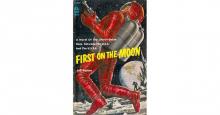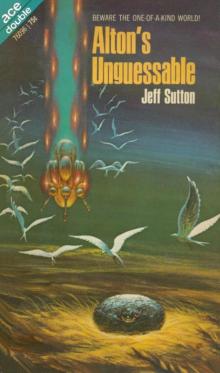- Home
- Jeff Sutton
First on the Moon Page 3
First on the Moon Read online
Page 3
CHAPTER 3
The great red sun was just breaking over the desert horizon when Craggot his last good look at earth. Its rays slanted upward, shadows fledfrom the sage; the obsidian sky with its strewn diamonds became slategray and, in moments, a pale washed blue. Daybreak over the desertbecame a thunder of light. Tiny ants had removed the last of the metalframework encompassing the rocket. Other ants were visible making lastminute cheeks.
He returned his attention to the space cabin. Despite long months oftraining in the cabin simulator--an exact replica of the Aztecquarters--he was appalled at the lack of outside vision. One narrowrectangular quartz window above the control panel, a circular port oneach side bulkhead and one on the floor--he had to look between hisknees to see through it when seated at the controls--provided the solevisual access to the outside world. A single large radarscope, a radaraltimeter and other electronic equipment provided analogs of the outsideworld; the reconstruction of the exterior environment painted on thescopes by electromagnetic impulses.
The cabin was little more than a long flat-floored cylinder with mostof the instrumentation in the nose section. With the rocket in launchposition, what normally was the rear wall formed the floor. The seatshad been swiveled out to operational position.
Now they were seated, strapped down, waiting. It was, Crag thought, likesitting in a large automobile which had been balanced on its rearbumper. During launch and climb their backs would be horizontal to theearth's surface.
He was thankful they were not required to wear their heavy pressuresuits until well into the moon's gravisphere. Normally pressure suitsand helmets were the order of the day. He was used to stratosphericflight where heavy pressure suits and helmets were standard equipment;gear to protect the fragile human form until the lower oxygen-richregions of the air ocean could be reached in event of trouble. But theAztec was an all-or-nothing affair. There were no escape provisions, noejection seats, for ejection would be impossible at the rocket's speedsduring its critical climb through the atmosphere. Either everything wentaccording to the book or ... or else, he concluded grimly. But it hadone good aspect. Aside from the heavy safety harnessing, he would befree of the intolerably clumsy suit until moonfall. If anything wentwrong, well ...
He bit the thought off, feeling the tension building inside him. He hadnever considered himself the hero type. He had prided himself that hisability to handle hot planes was a reflection of his competence ratherthan courage. Courage, to him, meant capable performance in the face offear. He had never known fear in any type of aircraft, hence neverbefore had courage been a requisite of his job. It was that simple tohim. His thorough knowledge of the Aztec's theoretical flightcharacteristics had given him extreme confidence, thus the feeling oftension was distracting. He held his hand out. It seemed steady enough.
Prochaska caught the gesture and said, "I'm a little shaky myself."
Crag grinned. "They tell me the first thousand miles are the hardest."
"Amen. After that I won't worry."
The countdown had begun. Crag looked out the side port. Tiny figureswere withdrawing from the base of the rocket. The engine of a fuel trucksounded faintly, then died away. Everything seemed unhurried, routine.He found himself admiring the men who went so matter-of-factly about thejob of hurling a rocket into the gulfs between planets. Once, during hisindoctrination, he had watched a Thor firing ... had seen the missileclimb into the sky, building up to orbital speed. Its launchers had beenthe same sort of men--unhurried, methodical, checking the minutiae thatwent into such an effort. Only this time there was a difference. Themissile contained men.
Off to one side he saw the launch crew moving into an instrumenteddugout. Colonel Gotch would be there, puffing on his pipe, his faceexpressionless, watching the work of many years come to ... what?
He looked around the cabin for the hundredth time. Larkwell and Nagelwere strapped in their seats, backs horizontal to the floor, looking upat him. The tremendous forces of acceleration applied at right angles tothe spine--transverse g--was far more tolerable than in any otherposition. Or so the space medicine men said. He hoped they were right,that in this position the body could withstand the hell ahead. He gave alast look at the two men behind him. Larkwell wore an owlish expression.His teeth were clamped tight, cording his jaws. Nagel's face was intent,its lines rigid. It gave Crag the odd impression of an alabastersculpture. Prochaska, who occupied the seat next to him facing thecontrol panels, was testing his safety belts.
Crag gave him a quick sidelong glance. Prochaska's job was in manyrespects as difficult as his own. Perhaps more so. The sallow-facedelectronics chief bore the responsibility of monitoring thedrones--shepherding, first Drone Able, then its sisters tofollow--across the vacuum gulfs and, finally, into Arzachel, a pinpointcavity in the rocky wastelands of the moon. In addition, he was chargedwith monitoring, repairing and installing all the communication andelectronic equipment, no small job in itself. Yes, a lot depended on thealmost fragile man sitting alongside him. He looked at his ownharnessing, testing its fit.
Colonel Gotch came on the communicator. "Pickering's in orbit," he saidbriefly. "No details yet."
Crag sighed in relief. Somehow Pickering's success augured well fortheir own attempt. He gave a last check of the communication gear. Themain speaker was set just above the instrument panel, between him andProchaska. In addition, both he and the Chief--the title he hadconferred on Prochaska as his special assistant--were supplied withinsert earphones and lip microphones for use during high noisespectrums, or when privacy was desired. Crag, as Commander, could limitall communications to his own personal headgear by merely flipping aswitch. Gotch had been the architect of that one. He was a man who likedprivate lines.
"Five minutes to zero, Commander."
Commander! Crag liked that. He struggled against his harnessing toglance back over his shoulder. Nagel's body, scrunched deep into hisbucket seat, seemed pitifully thin under the heavy harnessing. His facewas bloodless, taut. Crag momentarily wondered what strange course ofevents had brought him to the rocket. He didn't look like Crag's pictureof a spaceman. Not at all. But then, none of them looked like supermen.Still, courage wasn't a matter of looks, he told himself. It was amatter of action.
He swiveled his head around farther. Larkwell reclined next to Nagelwith eyes closed. Only the fast rise and fall of his chest told of hisinner tensions--that and the hawk-like grip of his fingers around thearm rests. Worried, Crag thought. But we're all worried. He cast asidelong glance at Prochaska. The man's face held enormous calm. Hereached over and picked up the console mike, then sat for what seemed aneternity before the countdown reached minus one minute. He plugged inhis ear-insert microphone.
"Thirty seconds...." The voice over the speaker boomed. Prochaskasuddenly became busy checking his instruments. Jittery despite hisseeming calm, Crag thought.
"Twenty seconds...." He caught himself checking his controls, as if hecould gain some last moment's knowledge from the banks of levers anddials and knobs.
"Ten ... nine ... eight...." He experimentally pulled at his harnessing,feeling somewhat hypnotized by the magic of the numbers coming over thecommunicator.
"Three ... two...."
Crag said, "Ready on one."
He punched a button. A muted roar drifted up from the stem. He listenedfor a moment. Satisfied, he moved the cut-in switch. The roar increased,becoming almost deafening in the cabin despite its soundproofing. Hetested the radio and steering rockets and gave a last sidelong glance atProchaska. The Chief winked. The act made him feel better. I should benervous, he thought, or just plain damned scared. But things werehappening too fast. He adjusted his lip mike and reached for thecontrols, studying his hand as he did so. Still steady. He stirred thecontrols a bit and the roar became hellish. He chewed his lip and took adeep breath, exhaling slowly.
He said, "Off to the moon."
Prochaska nodded. Crag moved the controls. The cabin seemed to bob,wobble, vibrate. A high hum came f
rom somewhere. He glanced downwardthrough the side port. The Aztec seemed to be hanging in mid-air justabove the desert floor. Off to one side he could see the concretecontrols dugout. The tiny figures had vanished.
He thought: _Gotch is sweating it out now_. In the past rockets hadburned on the pad ... blown up in mid-air ... plunged off course and hadto be destroyed. The idea brought his head up with a snap. Was there asafety officer down there with a finger on a button ... prepared todestroy the Aztec if it wavered in flight?
He cut the thought off and moved the main power switch, bringing thecontrol full over. The ship bucked, and the desert dropped away with asuddenness that brought a siege of nausea. He tightened his stomachmuscles like the space medicine doctors had instructed.
The first moment was bad. There was unbelievable thunder, a fraction ofa second when his brain seemed to blank, a quick surge of fear. Up ...up. The Aztec's rate of acceleration climbed sharply. At a prescribedpoint in time the nose of the rocket moved slightly toward the east. Itclimbed at an impossibly steep slant, rushing up from the earth. Cragswept his eyes over the banks of instruments, noted the positions of thecontrols, tried to follow what the faint voice in his earphone wastelling him. Dials with wavering needles ... knobs with blurrynumerals ... a cacophony of noise, light and movement--all this andmore was crowded into seconds.
The rocket hurtled upward, driven by the tidal kinetic energy generatedby the combustion of high velocity exhaust, born in an inferno ofthousands of degrees. Behind him giant thrust chambers hungrily consumedthe volatile fuel, spewing the high-pressure gases forth at more thannine thousand miles per hour. The crushing increased, driving himagainst the back of his seat. His heart began laboring ... became asledge hammer inside his chest wall.
He lost all sense of motion. Only the almost unendurable weight crushinghis body downward mattered. He managed a glimpse of the desert throughthe side port. It lay far below, its salient details erased. The roar ofthe giant motors became muted. There was a singing in his ears, a highwhine he didn't like.
The Aztec began to tilt, falling off to the right.
He cast a quick glance at the engine instruments. A red light blinked.Number three was delivering slightly less thrust than the others.Somewhere in the complex of machinery a mechanical sensing devicereacted. Engines one and two were throttled back and the rocketstraightened. A second device shifted the mix on engine three, bringingthrust into balance. All three engines resumed full power.
"Twenty-five thousand feet," Prochaska chattered. His voice was tinnyover the small insert earphone provided for communications, especiallyfor those first few hellish moments when the whole universe seemedcollapsed into one huge noise spectrum. Noise and pressure.
"Forty-five thousand...."
They were moving up fast now--three g, four g, five g. Crag's bodyweight was equal to 680 pounds. The dense reaches of thetroposphere--the weather belt where storms are born--dropped below them.They hurtled through the rarefied, bitterly cold and utterly calmstratosphere.
"Eighty thousand feet...."
Crag struggled to move his body. His hand was leaden on the controls, asif all life had been choked from it. A hot metal ball filled his chest.He couldn't breathe. Panic ... until he remembered to breathe at the topof his lungs.
At eighteen miles a gale of wind drove west. Rudders on the Azteccompensated, she leaned slightly into the blast, negating its drift. Thewinds ceased ... rudders shifted ... the rocket slanted skyward.Faster ... faster.
Prochaska called off altitudes almost continuously, the chattering gonefrom his voice. Crag was still struggling against the pinning weightwhen it decreased, vanished. The firestream from the tail pipe gave aburst of smoke and died. _Brennschluss_--burnout.
The Aztec hurtled toward the cosmic-ray laden ionosphere, driven only bythe inertial forces generated in the now silent thrust chambers. Thehard components of cosmic rays--fast mesons, high energy protons andneutrons--would rip through the ship. _If dogs and monkeys can take it,so can man._ That's what Gotch had said. He hoped Gotch was right.Somewhere, now, the first stage would fall away. It would follow them,at ever greater distances, until finally its trajectory would send itplunging homeward.
"Cut in." Prochaska's voice was a loud boom in the silence. A stridentvoice from the communicator was trying to tell them they were right onthe button. Crag moved a second switch. The resultant acceleration drovehim against the back of his seat, violently expelling the air from hislungs. He fought against the increasing gravities, conscious of pressureand noise in his ears; pressure and noise mixed with fragments of voice.His lips pulled tight against his teeth. The thudding was his heart. Hetightened his stomach muscles, trying to ease the weight on his chest. Amighty hand was gripped around his lungs, squeezing out the air. But itwasn't as bad as the first time. They were piercing the thermospherewhere the outside temperature gradient would zoom upward toward the2,000 degree mark.
Prochaska spoke matter-of-factly into his lip mike, "Fifty miles."
Crag marveled at his control ... his calm. No, he didn't have to worryabout the Chief. The little runt had it. Crag tried to grin. The effortwas a pain.
The Aztec gave a lurch, altering the direction of forces on their bodiesagain as a servo control kicked the ship into the long shallow spiral ofescape. It moved upward and more easterly, its nose slanted toward thestars, seeking its new course. Crag became momentarily dizzy. His visionblurred ... the instrument panel became a kaleidoscope of dancing,merging patterns. Then it was past, all except the three g force nailinghim to the seat.
He spoke into the communicator. "How we doing?"
"Fine, Commander, just fine," Gotch rasped. "The toughest part's over."
Over like hell, Crag thought. A one-way rocket to the moon and he tellsme the toughest part's over. Lord, I should work in a drugstore!
"Seventy-five miles and two hundred miles east," the Chief intoned. Cragmade a visual instrument check. Everything looked okay. No red lights.Just greens. Wonderful greens that meant everything was hunky-dory. Heliked green. He wanted to see how Larkwell and Nagel were making out butcouldn't turn his head. It's rougher on them, he thought. They can't seethe instruments, can't hear the small voice from Alpine. They just haveto sit and take it. Sit and feel the unearthly pressures and weights andhope everything's okay.
"Ninety-six miles ... speed 3.1 miles per second," Prochaska chanted ashort while later.
It's as easy as that, Crag thought. Years and years of planning andtraining; then you just step in and go. Not that they were there yet. Heremembered the rockets that had burned ... exploded ... the driftinghulks that still orbited around the earth. No, it wasn't over yet. Notby a long shot.
The quiet came again. The earth, seen through the side port, seemedtremendously far away. It was a study in greens and yellow-browns andwhitish ragged areas where the eye was blocked by cloud formations.Straight out the sky was black, starry. Prochaska reached up and swungthe glare shield over the forward port. The sun, looked at evenindirectly, was a blinding orb, intolerable to the unprotected eye.Night above ... day below. A sun that blazed without breaking the ebonskies. Strange, Crag mused. He had been prepared for this, prepared bylong hours of instruction. But now, confronted with a day that wasnight, he could only wonder. For a moment he felt small, insignificant,and wondered at brazen man. Who dared come here? I dared, he thought. Afeeling of pride grew within him. I dared. The stars are mine.
* * * * *
Stage three was easy by comparison. It began with the muted roar ofthrust chambers almost behind them, a noise spectrum almost solelyconfined to the interior of the rocket. Outside there was no longersufficient air molecules to convey even a whisper of sound. Nor wasthere a pressure build-up. The stage three engine was designed forextremely low thrust extended over a correspondingly longer time. Itwould drive them through the escape spiral--an orbital path around theearth during which time they would slowly increase both altitude andspeed.
> Crag's body felt light; not total weightlessness, but extremely light.His instruments told him they were breaching the exosphere, wheremolecular matter had almost ceased to exist. The atoms of the exospherewere lonely, uncrowded, isolated particles. It was the top of the airocean where, heretofore, only monkeys, dogs and smaller test animals hadgone. It was the realm of Sputniks ... Explorers ... Vanguards--all thetest rockets which had made the Aztec possible. They still sped theirsilent orbits, borne on the space tides of velocity; eternal tombs ofdogs and monkeys. And after monkey--man.
The communicator gave a burp. A voice came through the static. DroneAble was aloft. It had blasted off from its blasting pad at BurningSands just moments after the Aztec. Prochaska bent over the radarscopeand fiddled with some knobs. The tube glowed and dimmed, then it wasthere--a tiny pip.
Alpine came in with more data. They watched its course. Somewhere farbelow them and hundreds of miles to the west human minds were guidingthe drone by telemeter control, vectoring it through space to meet theAztec. It was, Crag thought, applied mathematics. He marveled at thescience which enabled them to do it. One moment the drone was just a pipon the scope, climbing up from the sere earth, riding a firestream tothe skies; the next it was tons of metal scorching through space,cutting into their flight path--a giant screaming up from its cradle.
It was Prochaska's turn to sweat. The job of taking it over was his. Hebent over his instruments, ears tuned to the communicator fingersnervous on the drone controls. The drone hurtled toward them at afrightening speed.
Crag kept his fingers on the steering controls just in case, his mindfollowing the Chief's hands. They began moving more certainly. Prochaskatossed his head impatiently, bending lower over the instrument console.Crag strained against his harnessing to see out of the side port. Thedrone was visible now, a silver shaft growing larger with appallingrapidity. A thin skein of vapor trailed from its trail, fluffing intonothingness.
_If angle of closure remains constant, you're on collision course._ Thewords from the Flying Safety Manual popped into his mind. He studied thedrone.
Angle of closure was constant!
Crag hesitated. Even a touch on the steering rockets could be bad. Verybad. The slightest change in course at their present speed would imposetremendous g forces on their bodies, perhaps greater than they couldstand. He looked at the Chief and licked his lips. The man was intent onhis instruments, seemingly lost to the world. His fingers had ceased allrandom movement. Every motion had precise meaning. He was hooked ontoDrone Able's steering rockets now, manipulating the controls withextreme precision. He was a concert pianist playing the strident musicof space, an overture written in metal and flaming gas. Tiny correctionsoccurred in the Drone's flight path.
"Got her lined up," Prochaska announced without moving his eyes from thescope. He gradually narrowed the distance between the rockets until theywere hurtling through space on parallel courses scant miles apart. Hegave a final check and looked at Crag. They simultaneously emitted bigsighs.
"Had me worried for a moment," Crag confessed.
"Me, too." The Chief looked out of the side port "Man, it looks like abattle wagon."
Crag squinted through the port. Drone Able was a silver bullet in space,a twin of the Aztec except in color. A drone with view ports. He smiledthoughtfully. Every exterior of the drone had been planned to make itappear like a manned vehicle. Gotch was the architect of that bit ofdeception, he thought. The Colonel hadn't missed a bet.
He looked at the earth. It was a behemoth in space; a huge curvedsurface falling away in all directions; a mosaic of grays punctuated byswaths of blue-green tints and splotches of white where fleecy cloudsrode the top of the troposphere. His momentary elation vanished,replaced by an odd depression. The world was far away, retreating intothe cosmic mists. The aftermath, he thought. A chill presentiment creptinto his mind--a premonition of impending disaster.

 Alien From the Stars
Alien From the Stars The Boy Who Had the Power
The Boy Who Had the Power First on the Moon
First on the Moon The Man Who Saw Tomorrow
The Man Who Saw Tomorrow Alton's Unguessable
Alton's Unguessable